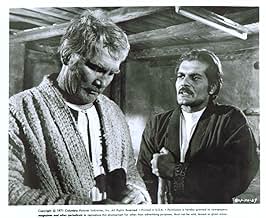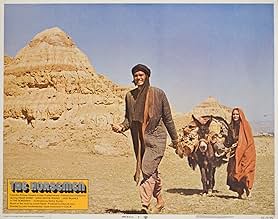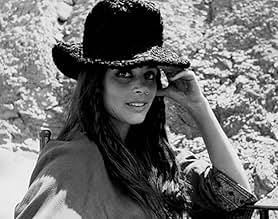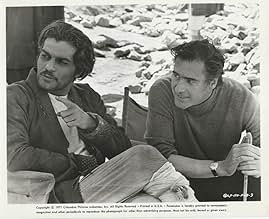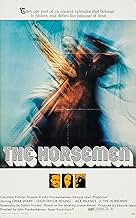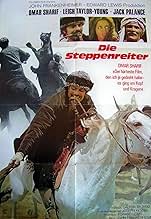AVALIAÇÃO DA IMDb
6,2/10
1,4 mil
SUA AVALIAÇÃO
Um drama que descreve a vida rural no Afeganistão contemporâneo e o amor do povo afegão por um esporte tradicional antigo semelhante ao polo a cavalo.Um drama que descreve a vida rural no Afeganistão contemporâneo e o amor do povo afegão por um esporte tradicional antigo semelhante ao polo a cavalo.Um drama que descreve a vida rural no Afeganistão contemporâneo e o amor do povo afegão por um esporte tradicional antigo semelhante ao polo a cavalo.
- Direção
- Roteiristas
- Artistas
Salmaan Peerzada
- Salih
- (as Salmaan Peer)
Aziz Resham
- Bacha to Ghulam
- (as Aziz Resh)
Vida St. Romaine
- Gypsy Woman
- (as Vida St Romaine)
Florencio Amarilla
- Arabian Man
- (não creditado)
Ishaq Bux
- Amjad Kahn
- (não creditado)
Carlos Casaravilla
- Messenger
- (não creditado)
- Direção
- Roteiristas
- Elenco e equipe completos
- Produção, bilheteria e muito mais no IMDbPro
Avaliações em destaque
An excellent adaptation of the Book by Joseph Kessel; centered on the running of the first Buskashi in Kabul by the King of Afghanistan circa the 1950s. I have read the book in its English translation(1968) and seen the Movie on VHS.(1671) The movie is very fresh and not dated; and all the more compelling due to recent liberation from Arab control of that country. Footage of the Buskashi just has to be from a real game. The games were played at Bagram (Bagrimi) the plain above Kabul which was made an airport in recent years.
The author, Kessel can be compared to Joseph Conrad and Hemmingway as he apparently lived what he wrote. The book has themes just as penetrating as "Heart of Darkness" or "the Old man and the Sea" and much has translated well to this Movie. The acting is well done and convincingly. Local color shots were done in the late sixties giving this film a truly timeless feeling with little motor traffic evident.
One inspired scene has Jack Palance as Chief breeder and legendary Horseman, interrupted in his instructions to his team by the noise of a Jet; and looking up to see contrails above.
This is a real treasure just begging to be on DVD.
The author, Kessel can be compared to Joseph Conrad and Hemmingway as he apparently lived what he wrote. The book has themes just as penetrating as "Heart of Darkness" or "the Old man and the Sea" and much has translated well to this Movie. The acting is well done and convincingly. Local color shots were done in the late sixties giving this film a truly timeless feeling with little motor traffic evident.
One inspired scene has Jack Palance as Chief breeder and legendary Horseman, interrupted in his instructions to his team by the noise of a Jet; and looking up to see contrails above.
This is a real treasure just begging to be on DVD.
There is so much of interest in this compelling film, set in Afghanistan. Based on the book by Joseph Kessells, a writer of rare insight.
Centered around the ancient game of Buzkashi, played on horseback, and only in the three northern provinces of Mazar-i-Sharif, Maimana and Kataghan. [The game had it's origin in a training routine instituted by Ghengiz Khan, which both conditioned his men for warfare and provided a means of feeding his army. A very large circle was formed by his warriors and as the circle closed no animal was permitted to escape.]
There are some terrific scenes of the first "Royal Buzkashi" played on Bagrami Plain, just outside Kabul, which had been decreed by the king. Also some great footage of the country, depicting the beautiful and varied terrain encountered as Uroz makes the self-imposed and dangerous journey back to his home province in the North.
The interplay of all the characters is an education in understanding the powerful role human emotion and upbringing play in all our lives, as both Tursen(the father) and Uroz(the son) attempt to come to terms with their own harsh anger and pride. The consequences spill over and embroil other individuals in the story. The story also gives some insight into the different way of thinking engendered by the cultural mix of religion,relatively isolated living, and living in a harsh environment where survival can be pretty raw.
Contrast is drawn by the mix of ancient and modern. One such scene has Tursen (Jack Palance),who as Head of Osman Bey's stable is addressing the chopendoz,(players of Buzkashi), pauses to look upwards at a jetliner passing overhead whilst he stands on "The Roof of the World". Another takes place in the modern hospital in Kabul.
Both Palance & Sharif give of their finest, very well supported by a great character cast.
A dramatic part of the story unfolds in the Bamian Valley, where Uroz gambles & loses the very thing he later realise he loves and wants back. Historically this part of the film contains important footage of the giant Budhas that were carved into the cliffside, until deliberately destroyed by Talliban militia.
All in all, an excellent and enjoyable film and I am surprised it has not been shown on Television or re-issued on disc, as the world focussed on that area just a short time ago.
Centered around the ancient game of Buzkashi, played on horseback, and only in the three northern provinces of Mazar-i-Sharif, Maimana and Kataghan. [The game had it's origin in a training routine instituted by Ghengiz Khan, which both conditioned his men for warfare and provided a means of feeding his army. A very large circle was formed by his warriors and as the circle closed no animal was permitted to escape.]
There are some terrific scenes of the first "Royal Buzkashi" played on Bagrami Plain, just outside Kabul, which had been decreed by the king. Also some great footage of the country, depicting the beautiful and varied terrain encountered as Uroz makes the self-imposed and dangerous journey back to his home province in the North.
The interplay of all the characters is an education in understanding the powerful role human emotion and upbringing play in all our lives, as both Tursen(the father) and Uroz(the son) attempt to come to terms with their own harsh anger and pride. The consequences spill over and embroil other individuals in the story. The story also gives some insight into the different way of thinking engendered by the cultural mix of religion,relatively isolated living, and living in a harsh environment where survival can be pretty raw.
Contrast is drawn by the mix of ancient and modern. One such scene has Tursen (Jack Palance),who as Head of Osman Bey's stable is addressing the chopendoz,(players of Buzkashi), pauses to look upwards at a jetliner passing overhead whilst he stands on "The Roof of the World". Another takes place in the modern hospital in Kabul.
Both Palance & Sharif give of their finest, very well supported by a great character cast.
A dramatic part of the story unfolds in the Bamian Valley, where Uroz gambles & loses the very thing he later realise he loves and wants back. Historically this part of the film contains important footage of the giant Budhas that were carved into the cliffside, until deliberately destroyed by Talliban militia.
All in all, an excellent and enjoyable film and I am surprised it has not been shown on Television or re-issued on disc, as the world focussed on that area just a short time ago.
This is a human condition action adventure that takes place in modern time( meaning 1971) Afghanistan. The film starts by showing how far back in time they are. Everybody is riding around on horses while planes are driving above them. In this country a proud (the best word would be prince but it doesn't exactly fit) Uraz (played by Omar Sharif, mostly known as that guy who had the lead in Doctor Zhivago) sets out to this weird horse tournament on the request of his father, a elderly clan leader and master of the sport played by the great Jack Palance.
It's made obvious from the start that though this man might be proud and even quite noble (he always bets on the weakest), he is in fact cruel to servants and have a rather nihilistic view on life. When he manages to fall off his horse and break his leg he feels a great dishonor and sets out to find the hardest and deadliest road home. On the way everything that is good in humans are questioned! The film has a very different view of the world than most others, at least this early in cinema. Many of the characters are so shady it will almost make you sick. I must say that I did not like these people as humans, though I did like their characters, inhuman behavior and cruelty is something I take a huge interest in. For those of you who enjoy to travel to different worlds and can enjoy and love films even if they perhaps have a different stand than your world view, this is the film for you.
I was quite taken by it I must say. My second favorite Frankenheimer picture to date, meaning that I thought it was better than great films such as The Manchurian Candidate, The Train and Seven Days in May. The colors are great and the mood and pacing is very intense. Most of the frames are quite beautiful. The acting is very good! And it's philosophy as a whole is rather good too but I will not give away anything about how this film turns out but I will say that I thought it was fabulous. A genius film! A masterpiece! You should definitely check it out. A true gem!
It's made obvious from the start that though this man might be proud and even quite noble (he always bets on the weakest), he is in fact cruel to servants and have a rather nihilistic view on life. When he manages to fall off his horse and break his leg he feels a great dishonor and sets out to find the hardest and deadliest road home. On the way everything that is good in humans are questioned! The film has a very different view of the world than most others, at least this early in cinema. Many of the characters are so shady it will almost make you sick. I must say that I did not like these people as humans, though I did like their characters, inhuman behavior and cruelty is something I take a huge interest in. For those of you who enjoy to travel to different worlds and can enjoy and love films even if they perhaps have a different stand than your world view, this is the film for you.
I was quite taken by it I must say. My second favorite Frankenheimer picture to date, meaning that I thought it was better than great films such as The Manchurian Candidate, The Train and Seven Days in May. The colors are great and the mood and pacing is very intense. Most of the frames are quite beautiful. The acting is very good! And it's philosophy as a whole is rather good too but I will not give away anything about how this film turns out but I will say that I thought it was fabulous. A genius film! A masterpiece! You should definitely check it out. A true gem!
This is an example of taking a book and adapting it to the large screen and realising with hindsight that it works better as a book . I'm not familiar with Joseph Kessel's original novel but the comments on this page state that the film is very faithful to the book and that might be the problem . It's a story that concentrates on obsession at winning at all costs and Uraz the protagonist is a universal metaphor for all mankind that when you want to win something it can cost you very dearly
You can perhaps see why the producers thought this would make a great film with its exotic locations and the fact it was st in Afghanistan before the land reforms the mid 1970s that led to civil war and the subsequent Soviet intervention is what made me seek out the film if only to understand Afghan culture better and the film does contain an intelligent opening when the audience are led to believe they're watching a scene from the 17th Century only to the Afghan rug pulled from under their feet as a jet plane screams over head . Likewise there's some spectacular scenes involving the sport of buzkashi where horsemen literally fight over the carcass of a dead goat and there's some impressive cinematography featuring the Afghan landscape but the inherent problem with the film is the character driven narrative which doesn't kindly lend itself to the medium of cinema
You can perhaps see why the producers thought this would make a great film with its exotic locations and the fact it was st in Afghanistan before the land reforms the mid 1970s that led to civil war and the subsequent Soviet intervention is what made me seek out the film if only to understand Afghan culture better and the film does contain an intelligent opening when the audience are led to believe they're watching a scene from the 17th Century only to the Afghan rug pulled from under their feet as a jet plane screams over head . Likewise there's some spectacular scenes involving the sport of buzkashi where horsemen literally fight over the carcass of a dead goat and there's some impressive cinematography featuring the Afghan landscape but the inherent problem with the film is the character driven narrative which doesn't kindly lend itself to the medium of cinema
Set in Afghanistan, John Frankenheimer's 'The Horsemen' is the story of a tribesman determined to rival his father at horsemanship
Uraz is sent by his father Tursen to win the traditional Royal Buzkashi on the field of Bagrami in the capital city of Kabul
Uraz on Jahil has to battle for control of a headless calf, carry it around a blue flag, and deposit it back in the 'Circle of Justice' thus signifying that he wins the king's pennant and remains as the master chapandaz of all Afghanistan During the tournament, opposing horsemen use their whips to urge on their horses and to hit the rider for the chance to snatch the heavy carcass
The motion picture turns around five well drawn characters: an angered son eaten up with vanity; a brave father who knew something worse than danger; a nomad woman whose touch defiles; a once loyal servant lusted for an 'unclean woman;' and a wager from the high passes of the East where 'men know how to forge fine weapons and use them well'
Uraz (Omar Sharif) deliberately chose to bribe his devoted servant with the magnificent white stallion in order to increase the already terrible dangers which he hopes to conquer
Zareh (Leigh-Taylor Young) urges her man to kill his high blood master to secure for herself his horse and his money
Tursen (Jack Palance) know nothing but evil legends about an impossible road taken by his embittered son His pain, remorse, and blood wept for a son lost through his fault
Mukhi (David de Keyser) forgets his humble and faithful world in the arms of the 'untouchable' woman who pushes him to murder the great prince
Hayatal (Peter Jeffrey) takes the challenge against 'the Prince Ram of the Valley' declaring openly to Uraz: 'What a one-horned ram can do, a one-legged chapandaz can do better!'
To understand 'The Horsemen' you must understand the rage, the beauty, and the tradition of a mountainous and landlocked country, isolated and left outside the mainstream of civilization
Written by Academy Award winner Dalton Trumbo (The Brave One, Best Original Screenplay, 1956) 'The Horsemen' is a passionate film for men only The film is a search that marks out the true concepts of honesty, integrity, loyalty, and trust
Uraz on Jahil has to battle for control of a headless calf, carry it around a blue flag, and deposit it back in the 'Circle of Justice' thus signifying that he wins the king's pennant and remains as the master chapandaz of all Afghanistan During the tournament, opposing horsemen use their whips to urge on their horses and to hit the rider for the chance to snatch the heavy carcass
The motion picture turns around five well drawn characters: an angered son eaten up with vanity; a brave father who knew something worse than danger; a nomad woman whose touch defiles; a once loyal servant lusted for an 'unclean woman;' and a wager from the high passes of the East where 'men know how to forge fine weapons and use them well'
Uraz (Omar Sharif) deliberately chose to bribe his devoted servant with the magnificent white stallion in order to increase the already terrible dangers which he hopes to conquer
Zareh (Leigh-Taylor Young) urges her man to kill his high blood master to secure for herself his horse and his money
Tursen (Jack Palance) know nothing but evil legends about an impossible road taken by his embittered son His pain, remorse, and blood wept for a son lost through his fault
Mukhi (David de Keyser) forgets his humble and faithful world in the arms of the 'untouchable' woman who pushes him to murder the great prince
Hayatal (Peter Jeffrey) takes the challenge against 'the Prince Ram of the Valley' declaring openly to Uraz: 'What a one-horned ram can do, a one-legged chapandaz can do better!'
To understand 'The Horsemen' you must understand the rage, the beauty, and the tradition of a mountainous and landlocked country, isolated and left outside the mainstream of civilization
Written by Academy Award winner Dalton Trumbo (The Brave One, Best Original Screenplay, 1956) 'The Horsemen' is a passionate film for men only The film is a search that marks out the true concepts of honesty, integrity, loyalty, and trust
Você sabia?
- CuriosidadesThe film began shooting using 65mm negative (Super Panavision), but during production Columbia Pictures went through a change in management. The budgets for this and another 65mm production, O Ouro de Mackenna (1969), were cut and both films were forced to switch over to 35mm anamorphic Panavision. However, both were released in 70mm, with the later-shot sections blown up. In later years, the mix-and-match formats made restoration of the films more time consuming and expensive than if they'd been shot entirely in 65mm, and they were preserved in 35mm only.
- Erros de gravaçãoWhen Tursen (Jack Palance) has a flashback to one of his past victories, one can tell that he is swinging a phony, lightweight, stuffed goat carcass around when his horse jumps up on the mud hut.
- Citações
District Chief: What demon has possessed you to mock these good people with that piece of dog-bait?
Principais escolhas
Faça login para avaliar e ver a lista de recomendações personalizadas
- How long is The Horsemen?Fornecido pela Alexa
Detalhes
- Data de lançamento
- País de origem
- Central de atendimento oficial
- Idioma
- Também conhecido como
- The Horsemen
- Locações de filme
- Afeganistão(Exterior)
- Empresas de produção
- Consulte mais créditos da empresa na IMDbPro
Bilheteria
- Orçamento
- US$ 6.000.000 (estimativa)
- Tempo de duração
- 1 h 49 min(109 min)
- Mixagem de som
- Proporção
- 2.35 : 1
Contribua para esta página
Sugerir uma alteração ou adicionar conteúdo ausente



